Find out if your feline friend can safely enjoy honey or if it could be a potential allergen, in this intriguing exploration.
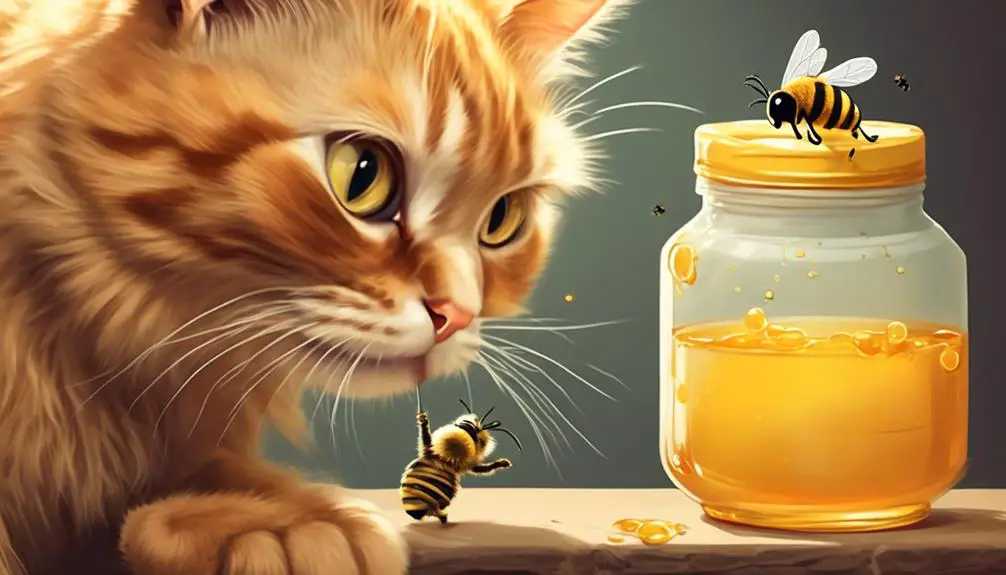
Are Cats Allergic to Honey
Just like Schrödinger's famous paradox, you're likely in a state of uncertainty when it comes to your cat's potential allergy to honey. You've heard that honey has numerous health benefits for humans, but you're unsure whether the same holds true for your feline friend. In fact, you may be wondering if honey might actually be harmful to cats.
Allergies in cats can manifest in various ways, from digestive issues to skin irritations. Can cats be allergic to honey? And if they can, how can you tell? These are the questions we're going to answer, so stick around to untangle this feline dilemma.
Key Takeaways
- Cat allergies are triggered by the immune system's response to harmless substances.
- Honey can potentially cause allergic reactions in cats, ranging from mild to severe symptoms such as vomiting and skin irritations.
- Honey can be a beneficial dietary supplement for cats in moderation, providing nutrients and antioxidants that support gut health.
- It is important to consult a veterinarian before introducing honey into a cat's diet, especially for cats with allergies or diabetes.
Understanding Cat Allergies
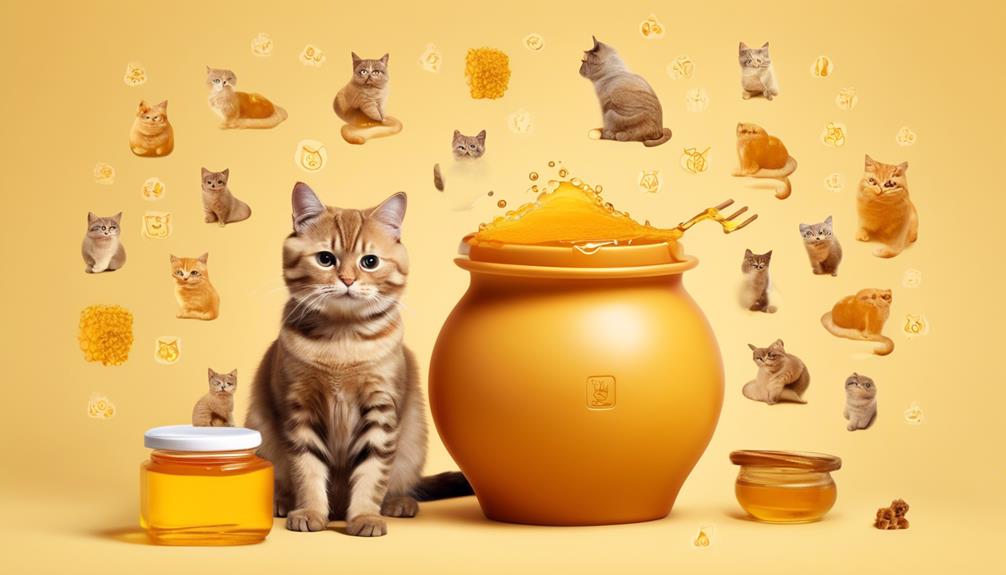
To fully grasp why your feline friend might react adversely to certain foods or substances such as honey, it's crucial to delve into the complex world of cat allergies. Much like humans, cats can develop allergies to various substances present in their environment, including certain foods. These allergies occur when your cat's immune system mistakenly identifies a harmless substance as a threatening invader and reacts to defend the body. This reaction triggers a series of symptoms that can range from mild to severe.
Food allergies in cats are often characterized by symptoms such as vomiting, diarrhea, and skin conditions. However, pinpointing the specific food causing the allergy can be a challenging task. It's important to note that an allergic reaction doesn't necessarily mean the food is harmful; rather, it's your cat's unique immune response causing the issue.
In the case of honey, while it's not a common allergen for cats, it's still possible for your pet to have an adverse reaction. If you're considering introducing honey into your cat's diet, it's recommended to proceed with caution and consult a vet beforehand. This step ensures your cat's health and well-being remain a priority.
The Science Behind Honey
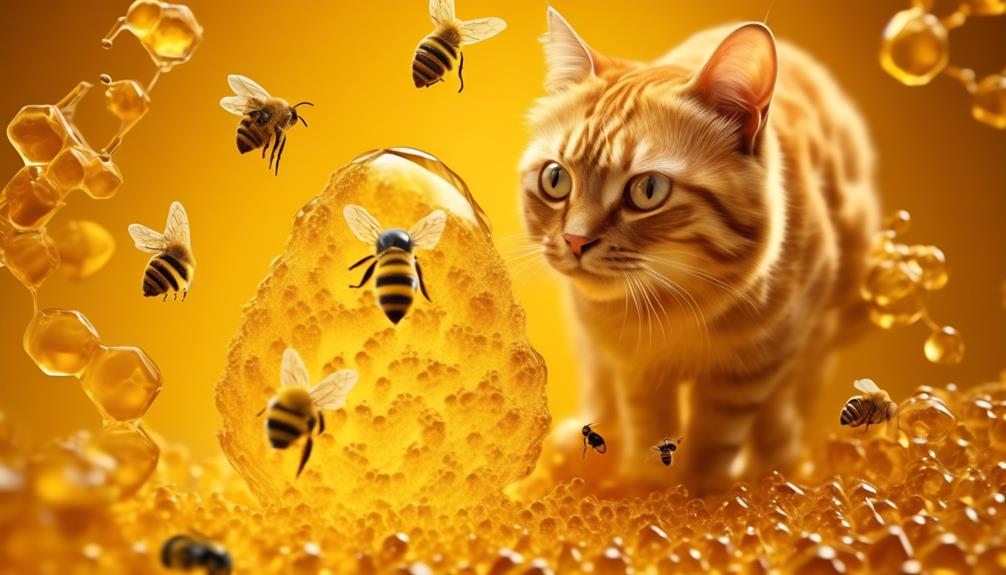
Diving into the science behind honey, you'll find it's a complex substance, rich in sugars, antioxidants, and other compounds that can potentially affect your cat's health in various ways. Honey is primarily composed of fructose and glucose, but it also contains other sugars, as well as water, minerals, and trace amounts of vitamins. It's the unique combination of these elements that gives honey its potential health benefits, and its distinctive taste.
What's more, honey has antimicrobial properties due to its acidity and the presence of peroxide-producing enzymes. This makes it beneficial for wound healing, but it's not clear how these properties might interact with a cat's physiology.
The concentration of sugars in honey can be problematic for cats. Cats can't process sugars the same way humans do, and a high-sugar diet can lead to obesity and diabetes. Furthermore, their digestive system isn't designed to handle the complex sugars in honey, potentially causing digestive upset.
The antioxidants in honey, including phenols and flavonoids, are beneficial to human health, but their effect on cats is less clear. More research is needed to fully understand how these compounds affect cats and whether they can safely consume honey.
Potential Allergic Reactions to Honey
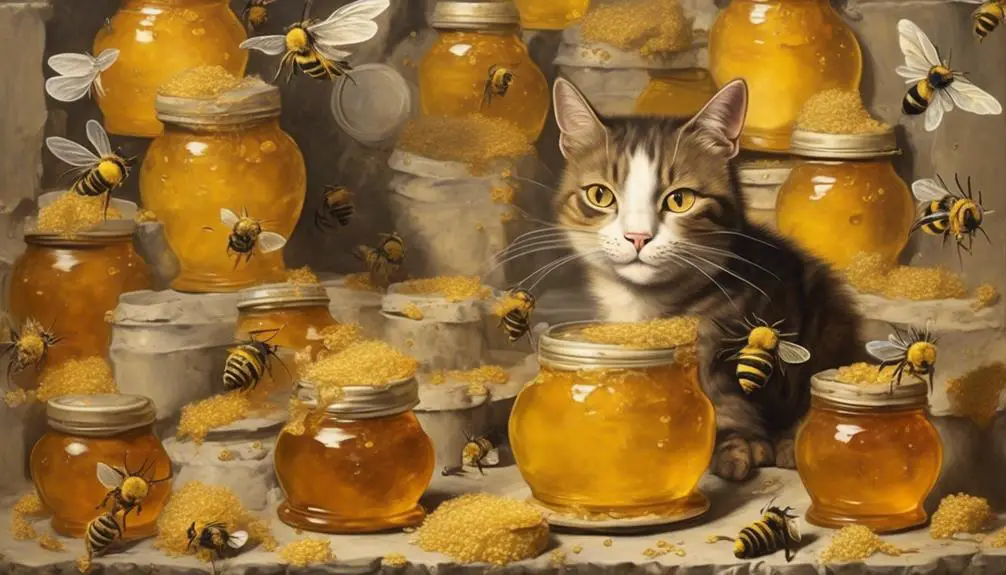
While your feline friend's exposure to honey might not be a common occurrence, it's important to understand the potential allergic reactions honey can cause in cats. These reactions can vary from mild to severe, depending on the cat's sensitivity. If your cat is allergic to honey, she may experience symptoms such as vomiting, diarrhea, and skin irritations.
To better understand, let's evaluate a simple table:
Symptom | Description | Severity |
|---|---|---|
Vomiting | Your cat might regurgitate her food. | Moderate |
Diarrhea | Your cat might have frequent loose or liquid bowel movements. | Moderate |
Skin Irritations | Your cat might develop rashes, hives, or itching. | Mild to Severe |
If your cat exhibits any of these symptoms after consuming honey, it's crucial to seek immediate veterinary attention. Remember, while honey is generally safe for most cats in small quantities, it's not a necessary part of their diet. Therefore, it's better to err on the side of caution and avoid giving honey to your cat, especially if she has a known allergy or sensitivity.
Honey as a Feline Dietary Supplement
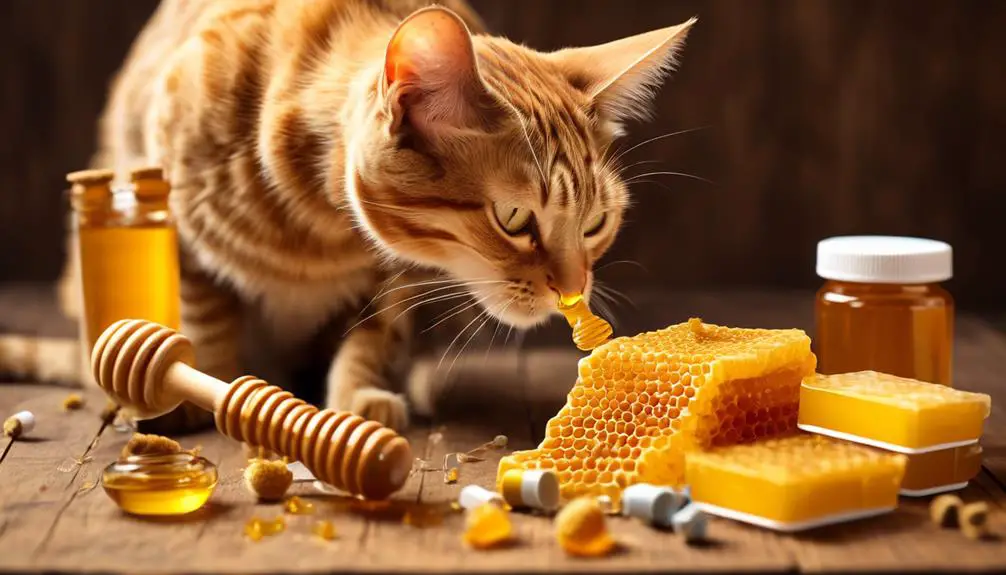
Despite its potential allergenic properties, honey can serve as a dietary supplement for cats, given its rich nutrient content and health benefits. You might be wondering how to incorporate honey into your cat's diet. Moderation is key. You should never replace your cat's regular food with honey. Instead, consider it as an occasional treat or a supplement.
Honey is rich in antioxidants, vitamins, and minerals, which can support your cat's overall health. It's particularly beneficial for cats with digestive issues as it promotes gut health. Also, its anti-inflammatory properties can help alleviate symptoms of allergies in some cats. However, there's still ongoing research into its effectiveness.
But you should be cautious. Not all cats react well to honey. Some may have allergies or diabetes, which could be exacerbated by honey's high sugar content. Always consult with your vet before introducing new foods into your cat's diet.
Safe Honey Consumption Guidelines for Cats
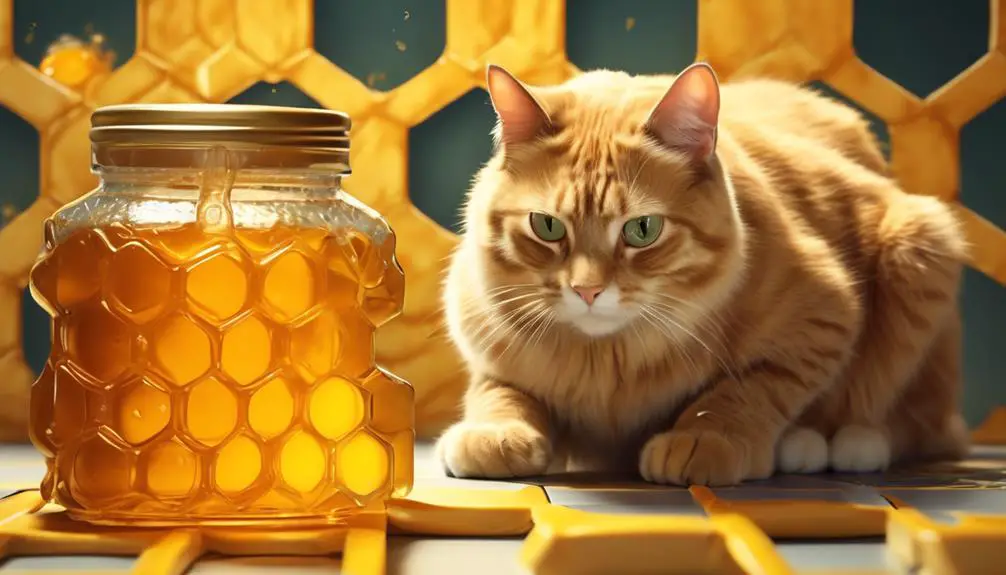
Given the potential risks and benefits associated with honey consumption in cats, it's essential to understand the guidelines for safe and beneficial use. Though honey isn't toxic to cats, it should be given sparingly due to its high sugar content. Obesity and diabetes are common in domestic cats and too much honey can exacerbate these conditions.
Firstly, consider the quality of the honey. It should be raw and unfiltered, as processed types often contain additives that could be harmful to your cat. Also, ensure that it's free of botulism spores, which are particularly harmful to kittens.
Next, take into account your cat's size and health status. A small amount, no more than half a teaspoon per day, is usually safe for healthy, adult cats. However, if your cat has any health issues, particularly those related to digestion or sugar metabolism, consult your vet before introducing honey into their diet.
Lastly, monitor your cat's reaction. If you notice any changes in behavior, appetite, or digestive health, stop the honey immediately and seek veterinary advice. Remember, while honey can have health benefits, it's not a necessary part of your cat's diet. Prioritize a balanced, high-quality cat food for optimal health.
Conclusion
In conclusion, while honey isn't a typical allergen for cats, it's not completely risk-free. Some cats can have allergic reactions to honey, while others safely enjoy it as a dietary supplement.
As a cat owner, it's crucial to understand the science behind honey and monitor your feline friend for any adverse responses. Always follow safe honey consumption guidelines to ensure your cat's health and wellbeing.
Remember, when in doubt, consult your vet.

